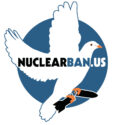To see video of this webinar, click here
The Nuclear Ban Treaty enters into force on January 22, 2021 in the first 50 countries that have ratified it. Another 34 countries are in the process of ratification, and many more will follow. What will this mean for the US, which has not ratified this Treaty and shows no immediate sign of doing so? NuclearBan.US Director Timmon Wallis will discuss the legal, financial and political implications of the Nuclear Ban Treaty as it is about to enter into force in 50 countries.
Spoiler Alert
As with other international treaties that the US has still not joined, this treaty will have important impacts on the US. First of all, this treaty changes the global conversation about nuclear weapons and about the whole theory of “nuclear deterrence.” It significantly weakens the argument for maintaining these weapons, and adds to the pressure for their total elimination. But it also has direct affects on US military operations around the world, US military posture and US military doctrines, since the US military does not operate in a vacuum but in partnerships with many other countries, more and more of whom will sooner or later join this treaty.
But the most significant affect of this treaty, by far, will be immediately felt by the private corporations that are responsible for developing, building and maintaining the world’s nuclear arsenals. Fifteen of the largest nuclear weapons contractors are based in the US, but they all have offices, plants, operations, contracts, suppliers, investors and other business relations in many other countries. Some of these countries are already among the first 50 to ratify the Nuclear Ban Treaty, and US-based nuclear weapons corporations will be breaking the law in those countries as of January 22nd 2021.
Different countries will inevitably interpret their obligations under the Nuclear Ban Treaty and how they enforce those obligations in different ways.






